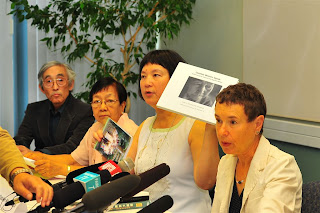Oleh: Salahuddin Wahid (Wakil Ketua Komnas HAM 2002-2007; Pengasuh Pesantren Tebuireng)
Dua belas tahun berlalu sejak Tragedi Mei 1998, salah satu tragedi kelam yang pernah menimpa kita. Total ada 1.338 orang tewas dan 92 wanita Tionghoa mengaku diperkosa walaupun sampai hari ini masih disangkali negara.
Warga yang tidak mengalami mungkin sudah banyak yang melupakan peristiwa keji itu. Akan tetapi, bagi korban dan keluarganya hal itu akan tetap ada dalam ingatan walau ada yang bisa memaafkan. Apalagi, perjuangan keluarga korban untuk memperoleh keadilan tidak mendapat perhatian memadai dari pemerintah.
Kita pun sudah melupakan siapa yang harus bertanggung jawab dan apa penyebab timbulnya kerusuhan itu. Komnas HAM melakukan penyelidikan pro justicia kasus tersebut pada 2003 dan menyerahkan laporan ke DPR dan Kejaksaan Agung. Akan tetapi, sampai saat ini tak ada langkah tindak lanjut apa pun.
Penyelidikan Komnas HAM mengungkap fakta bahwa peristiwa itu tidak terjadi tiba-tiba dan kebetulan, melainkan dipersiapkan dengan matang oleh kekuatan yang berpengalaman dan tahu persis apa yang harus dilakukan. Pelaku di lapangan juga bukan sembarang orang, mereka terlatih dan mampu secara fisik dan mental. Tim Komnas HAM tidak mampu mengungkap siapa kekuatan di balik kerusuhan itu. Hanya Kejaksaan Agung yang bisa mengungkap lewat penyidikan.
Tak bisa disalahkan kalau banyak pihak menduga mereka yang punya pengalaman, kemampuan, dan terlatih itu terkait dengan militer, seperti oknum TNI, desertir, atau tentara bayaran (kalau ada). Namun, kita gegabah kalau menuduh oknum TNI sebagai dalang atau pelaksana kerusuhan itu tanpa bukti.
Dugaan keterlibatan
Walau sudah menduga apa jawabannya, mengikuti pikiran kritis yang agak liar, dalam sebuah diskusi tidak resmi beberapa tahun lalu saya memaksakan diri bertanya kepada seorang mayor jenderal TNI yang pada 1998 aktif di lembaga intelijen TNI. Apakah betul tidak ada oknum TNI yang terlibat dalam tragedi itu? Mengapa intelijen TNI tidak mampu mendeteksi potensi kerusuhan itu?
Mayjen tersebut tentu membantah ada oknum TNI yang terlibat, tetapi mengakui bahwa intelijen TNI dan Bakin tak mampu mendeteksi atau kecolongan. Pihak perencana dan pelaksana itu lebih unggul dibandingkan dengan lembaga intelijen dan kita tidak tahu apakah lembaga intelijen yang sekarang sudah jauh meningkat.
Lalu saya tanyakan apakah betul kesimpulan berikut: kalau tidak ada oknum atau desertir TNI yang merencanakan dan menjalankan kerusuhan itu, mungkinkah ada pihak lain yang punya kepentingan, kekuatan, dan kemampuan juga melakukan kerusuhan yang sama?
Artinya, jika suatu waktu pihak itu merasa sudah tiba saat yang tepat untuk melakukan tindakan keji (lagi) dan ada kebutuhan memaksa, maka pihak tersebut akan bisa melakukan dan pihak intelijen kita tidak mampu mendeteksi.
Sang Mayjen tidak menyetujui kesimpulan saya, tetapi jawabannya tidak meyakinkan. Maka, tidak ada salahnya saya mengangkat masalah itu kepada masyarakat. Mungkinkah kerusuhan terulang lagi pada masa depan? Apakah faktor sosial-politik- ekonomi memicu pihak pelaku kerusuhan? Apakah faktor semacam itu kini sudah tampak gejalanya? Mungkinkah kita menengarai dan mewaspadai pihak yang berpotensi melakukan?
Kita perlu mengungkap semua teka-teki itu bukan hanya mencari siapa yang bertanggung jawab, tetapi lebih kepada upaya mencegah terjadinya kembali kerusuhan keji itu. Dengan demikian, sangat layak kalau kita mendorong Kejaksaan Agung agar menyidik kasus Mei 1998 dan kasus-kasus terkait. Presiden, yang pada 2005 sudah berjanji kepada orangtua korban kasus Trisakti, perlu mendesak Kejaksaan Agung untuk menyidiknya.
Jangan kecolongan lagi
Situasi sosial-ekonomi- politik saat ini belum dianggap bisa memicu kerusuhan. Kekecewaan rakyat memang meningkat, tetapi jauh di bawah kondisi tahun 1998. Kita harus selalu mewaspadai perkembangan dan jangan sampai kecolongan lagi. Ketidakpercayaan kepada aparat penegak hukum harus ditanggapi dengan langkah nyata memperbaikinya.
Akan tetapi, kalau ada kerusuhan lagi, apakah keturunan Tionghoa kembali jadi sasaran? Amy Chua, profesor dari Yale University, mengakui ada kemungkinan cukup besar, seperti diungkapkannya dalam buku World on Fire, How Exporting Free Market Democracy Breeds Ethnic Hatred and Global Instability, 2003. Menurut dia, keturunan Tionghoa selama pemerintahan Orde Baru telah mengalami aneka kebijakan: ganti nama, larangan memakai bahasa Tionghoa, larangan merayakan Imlek, dan larangan menganut agama orang Tionghoa. Kekerasan Mei 1998 membuktikan bahwa kebijakan itu gagal.
Lebih lanjut, Amy Chua menganalisis, kelompok minoritas Tionghoa adalah kelompok market-dominant minorities yang kaya raya berkat sistem ekonomi pasar. Ini yang menimbulkan rasa iri hati dari kelompok mayoritas yang miskin. Ketidakpuasan itu ditambah kekurangmampuan dan kurangnya kapasitas kepolisian menjaga keselamatan pihak yang membutuhkan sehingga memperberat situasi.
Oleh karena itu, perlu dijalankan kebijakan ekonomi yang betul-betul memihak rakyat, khususnya di daerah perkotaan yang amat rawan dihasut dan berpotensi ikut-ikutan terlibat dalam kerusuhan. Pendekatan Pemprov DKI dan banyak kota besar lain, seperti penggusuran terhadap pedagang tradisional demi kepentingan pemodal yang umumnya kalangan Tionghoa jelas seperti menumpuk jerami kering yang mudah terbakar. Pemerintah kota besar bisa belajar dari Wali kota Solo yang bersedia berunding lebih dari 50 kali dengan pedagang untuk mencari kesepakatan merevitalisasi pasar tradisional.





